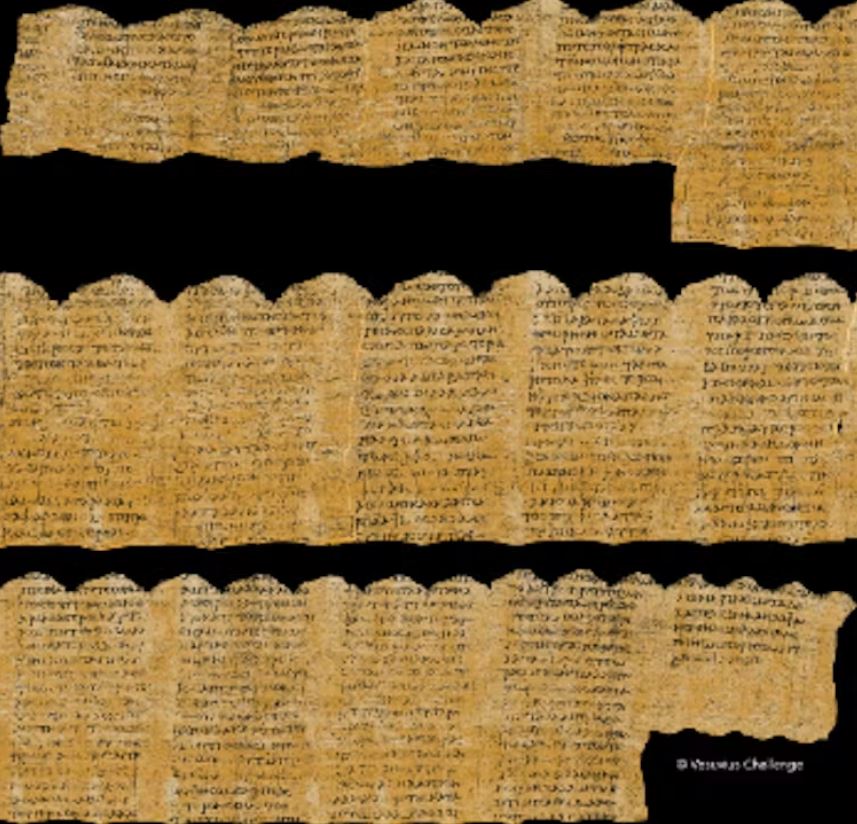
ΑΙhub.org
The Vesuvius Challenge is using AI to virtually unroll Pompeii’s ancient scrolls
 A closed carbonised papyrus scroll from Herculaneum being scanned. Image credit: EduceLab/University of Kentucky.
A closed carbonised papyrus scroll from Herculaneum being scanned. Image credit: EduceLab/University of Kentucky.
By Kilian Fleischer, University of Tübingen
The Vesuvius Challenge is an unparalleled competition in the field of classical studies, with the potential to pave the way for something akin to a second Renaissance. Its objective is to use artificial intelligence (AI) to virtually unroll hundreds of closed papyrus scrolls, containing ancient literature that has not been seen for 2,000 years.
When Mount Vesuvius erupted in AD79, it buried various cities at the Gulf of Naples under massive volcanic material – including Herculaneum, located near Pompeii. In the 18th century, an exceptionally luxurious Roman villa was excavated there, close to the ancient city walls and shoreline. The villa’s marvellous wall paintings, mosaics, busts and statues had been conserved by the ashes.
This building, Villa of the Papyri, is named after its most remarkable treasure. It housed the only preserved library from antiquity: around 1,000 papyrus scrolls that were not destroyed by the eruption, but carbonised (turned into a kind of charcoal) and sealed in the earth until their rediscovery.
The villa probably belonged to Lucius Calpurnius Piso Caesoninus, a Roman consul and Julius Caesar’s father-in-law. He was the patron of the Epicurean philosopher Philodemus of Gadara (110-30BC), who may have lived in the villa.
Before moving to Italy, Philodemus was educated in Athens at the philosophical centre of the Epicureans. Its founder, Epicurus, proclaimed the world was made up of atoms and considered pleasure, friendship and atheism as essentials for a happy life.
 A reconstruction of the Villa of the Papyri. Image credit: University of Kentucky/Museo Archeologico Virtuale/Ercolano.
A reconstruction of the Villa of the Papyri. Image credit: University of Kentucky/Museo Archeologico Virtuale/Ercolano.
The original Greek texts of the Epicureans were lost in late antiquity, but a Latin poetic version of Epicurus’s philosophical views survived. It dealt with ethics and especially physics, and was titled On The Nature Of Things.
Since their discovery, several attempts have been made to mechanically unroll the fragile papyri, with only modest success. Many scrolls were almost completely destroyed, while others were badly damaged and are now very fragmentary. Parts of over 300 scrolls stored in Naples are still waiting to be unrolled.
What does all this have to do with AI? The plan for noninvasive reading of the Herculaneum papyri was first pursued by University of Kentucky computer scientist Brent Seales in 2007. He worked on the problem for about 15 years. But while he succeeded with other scrolls, the Herculaneum papyri proved very tricky.
Seales recognised that the key to discerning the carbon ink from the carbonised papyrus background was AI. Initial experiments confirmed his hypothesis that AI could help recover the elusive ink from the CT scans, but significant challenges remained to unlock the secrets of the scrolls.
Silicon Valley entrepreneur Nat Friedman came across Seales’s work and suggested they establish an open-source AI challenge to accelerate the progress. Several prizes, including one of USD$1 million (£771,835), were promised to people or teams who could finally crack the scrolls.
 An ethical Epicurean treatise, probably by Philodemus, uncovered by the competition. Image credit: Vesuvius Challenge.
An ethical Epicurean treatise, probably by Philodemus, uncovered by the competition. Image credit: Vesuvius Challenge.
Since March 2023, more than 1,000 teams have entered this competition. In October 2023, the first letters and lines of Greek text were detected, and in February 2024, the first winners of the prize money – machine learning students Youssef Nader, Luke Farritor and Julian Schilliger – were announced. Their AI model spectacularly revealed parts of 15 columns from the innermost part of one of the scrolls. It was a text on ethics, probably written by Philodemus.
How the scroll was read
This “virtual unrolling” technique starts by scanning the carbonised scroll in a particle accelerator at super-high resolution. Then, the complex structure of the scroll is analysed and virtually flattened – but no text can yet be seen. At this point, the team trains ink detection AI models on the papyrus, based on distinct patterns that have been isolated through visual inspection.
The winning images can be considered definitive proof of concept – virtually unrolling the Herculaneum scrolls is possible. Although several technical difficulties remain, many of the other unopened scrolls should be virtually unrolled in the near future.
This breakthrough facilitated the funding of phase two of the Vesuvius Challenge, with donors including Elon Musk’s charity, the Musk Foundation. The next objective is to scan more scrolls and to accelerate and standardise the virtual unrolling process.
It is highly possible that dozens of new ancient Greek and Latin texts will emerge over the next few years. We can extrapolate the types of text to expect based on those already unrolled mechanically. As the Greek library was a special Epicurean library, most of the emerging works should cover topics like ethics, mathematics, music, and the history of philosophy.
Some Stoic literature might appear – and Epicurean texts also often contain lengthy citations from other philosophers or authors, as well as previously unknown historical information.
But the biggest surprises may come from the Latin papyri. We can reasonably hope for historical and poetical Latin works from Rome’s late Republican and early Imperial periods.
There is also the possibility that the virtual unrolling may prompt new excavations at the Villa of the Papyri (phase four of the Vesuvius Challenge). Many researchers believe that another Greek and Latin library – with its all lost masterpieces – has yet to be unearthed.
![]()
Kilian Fleischer, Head of DFG-project/Lecturer in Classics, University of Tübingen
This article is republished from The Conversation under a Creative Commons license. Read the original article.










